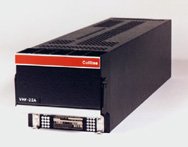| Part #: | 622-6390-001 |
|---|---|
| Model: | VHF-21B |
| Desc: | VHF Comm Transceiver |
| OEM: | Collins Aerospace |
| NSN: | 5821-01-330-6120 |
|---|---|
| Sched-B: | 8525601025 |
| ECCN: | 7A994 |
| Cage Code: | 13499 |
 Select part number above to view pricing and availability.
Select part number above to view pricing and availability.
| Price | Condition | Status | More Info | |
|---|---|---|---|---|
| REQUEST | OH OUTRIGHT | REQUEST LEAD TIME |
|

VHF-21B
Image shown is VHF-22A due to similarities in appearance between units.
- Proline II remote-mounted, multichannel VHF voice transceiver providing AM voice communications in the frequency range from 118.000-151.975 MHz
- VHF-21( ) Series radios intended as direct replacement for VHF-20, VHF-20A and VHF-20B units
- Can be used with Proline II CTL-22 control
- Accept either 2-out-of-5 parallel or RS-422A serial digital tuning data from frequency control unit
- Models available with narrow bandwidth intended for operation in areas using 25-kHz channel spacing with or without offset carriers
- Models available with wide bandwidth that will operate satisfactorily in areas where the received carrier frequency varies as much as 13 kHz from nominal (see table below)
| Weight: | 4.7 lbs. | Dimensions: | 3.75"W x 3.36"H x 14.0"L |
| FAA TSO: | C37c, C38c | EUROCAE: | ED-23, ED-24 |
| FCC: | Part 15, Part 87 | Environmental: | DO-160A, categories /A2E1/B/ JY/EXXXXXXZ/BZ/AZA, EUROCAE ED-14A |
| Temperature: | -54 to 70C (operational) | Altitude: | 70000 ft. |
| Frequency Stability: | +-0.0015% | Frequency control: | CSDB or ARINC 2-out-of-5 |
| Power Requirements: | Receive- 0.5A (14W) at 27.5 VDC; Transmit- 6.0A (165W) at 27.5 VDC | Output Power: | 16W minimum into a 52 ohm resistive load |
| Modulation: | 85% modulation capability with less than 15% distortion; 95% limiting | Sidetone: | 100 mW into 600 ohm load |
| Duty cycle: | 1-minute transmit; 4-minute receive | Receiver Sensitivity: | 3 uV for 6dB (s+n)/n |
| Receiver Selectivity: | -001, 011 units= typical 6dB at +-8 kHz, 60dB at +-17 kHz | Receiver Selectivity: | -002, 012 units= typical 6dB at +-15 kHz, 60dB at +-35 kHz |
| AGC charac: | 3dB max variation, 5uV to 1V | Receiver audio output: | 100 mW into 600 ohm load |
| Part Number | VHF Communications Transceiver Description: |
|---|---|
| 622-6390-001 | 1360 channels with narrow selectivity |
| 622-6390-002 | 1360 channels with wide selectivity |
NSN: 5821-01-330-6120
| Price | Condition | Status |
|---|---|---|
| REQUEST | OH OUTRIGHT | REQUEST LEAD TIME |
Click on a question below to see the answer. If you have a question about this model that is not answered below, please contact questions@seaerospace.com
Why do some parts indicate "REQUEST" or “RFQ” on the Southeast Aerospace website?
In relation to NE (New) parts, many OEMs change their prices and availability without any notice to dealers or the industry. Therefore, through the REQUEST or RFQ indication, we ask that customers contact us for the most accurate price and availability.
In relation to SV & OH parts, the used parts aftermarket in the aviation industry is not an infinite supply. It is a dynamic, constantly changing market that is significantly affected by and susceptible to highs and lows in supply and demand. Therefore, although we attempt to, at times, we are unable to predict the exact moment when an item may be available. Once again, through the REQUEST or RFQ indication on our website, we ask that customers contact us for the most current and accurate price and availability.
What is meant by 50 kHz (i.e. narrow vs. wide) receiver selectivity?
With the evolution and growth of airborne travel and the necessity for more usable frequencies in the VHF communications spectrum, the "channel" spacing became smaller. To avoid interference between channels the bandwidth of the RF stages was decreased from 50khz to 25khz. In doing so, another problem was introduced. If the ground transmitter or the air to air transmitter was not capable of tighter frequency tolerances, it was possible the 25khz RF selectivity would not allow the receive signal to pass and the aircraft crew could miss critical voice communications.
Due to the presence of older, outdated equipment in some countries, some manufacturers (namely Bendix/King and Collins) produced VHF comm radios with the 50khz receiver selectivity. With the recent mandates and technological advancements in Europe and South America, the requirements for the 50khz versions has diminished. If an operator were to use a 50khz version radio in the position of a 25khz, they would potentially have channel crossover and or an increase in background noise.

